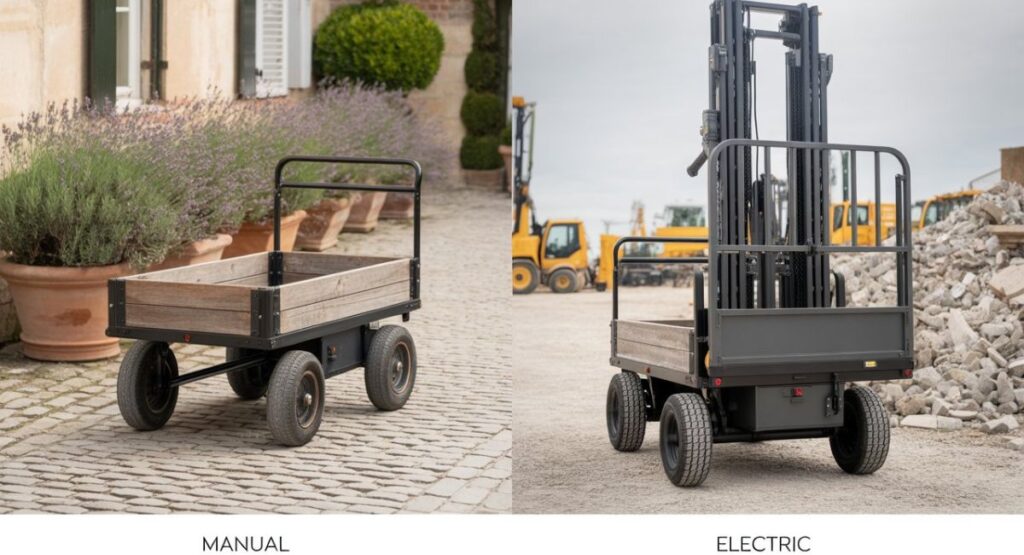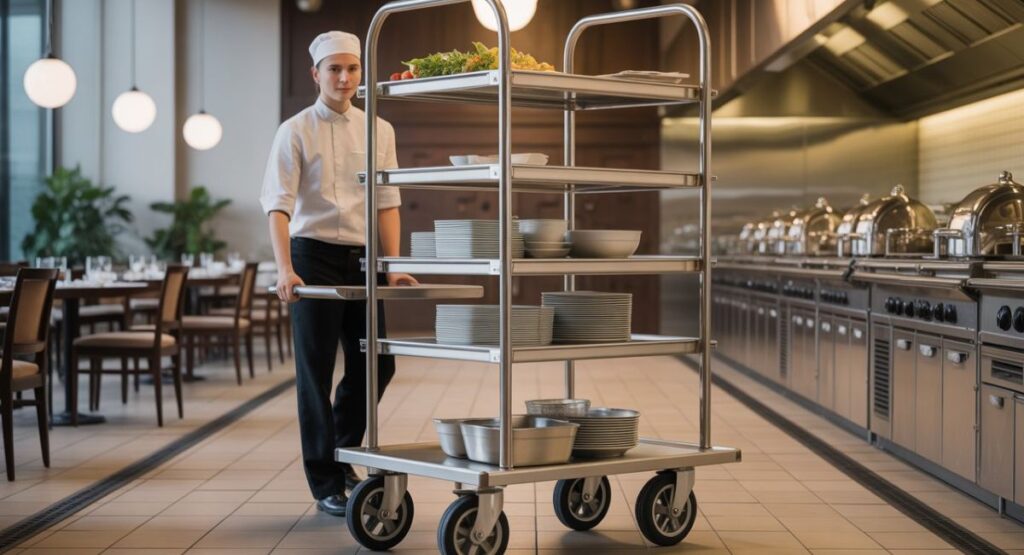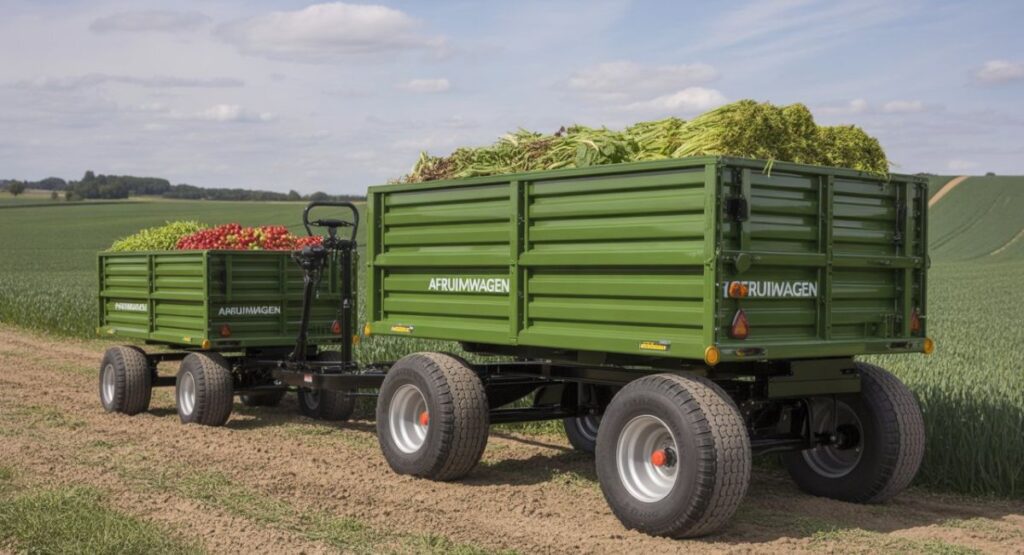The word Afruimwagen may sound unfamiliar to many, but it refers to a very practical piece of equipment used in many industries. If you have ever visited a farm, a construction site, a hotel kitchen, or even a waste collection center, chances are you have already seen one of these vehicles in action. So, what is an Afruimwagen? In simple words, it is a clearing cart or transport wagon used to carry, move, and unload different kinds of loads.
From material handling vehicles in factories to restaurant clearing cart solutions, Afruimwagens make work faster and easier. They reduce manual labor, improve safety, and save time. They also come in different designs, sizes, and power sources. Some are simple manual transport carts, while others are advanced battery-powered Afruimwagens with hydraulic lift carts.
- Benefits of Afruimwagens
- Types of Afruimwagens
- Manual vs Electric Afruimwagen
- Best Afruimwagen for Agriculture
- Afruimwagens for Construction Use
- Afruimwagens in Hospitality and Food Service
- Eco-Friendly Transport Wagon and Sustainability
- How do Afruimwagens Work?
- Afruimwagen Maintenance Tips
- Where to Buy Afruimwagens
- Future of Electric Transportation and Afruimwagens
- Conclusion
Benefits of Afruimwagens
The benefits of Afruimwagens are clear across industries. In agriculture, they carry crops like potatoes, corn, or wheat from the field to storage. In construction, they move soil, gravel, and debris. In hospitality, they serve as tray return systems, hotel dish trolleys, and restaurant service equipment.
One major advantage is that they are load-bearing vehicles built for durability. A durable material Afruimwagen lasts for years even under heavy use. They also increase efficiency by reducing the time needed for manual transport. Case studies from farms in the Netherlands show that using an Afruimwagen with hydraulic lift reduced labor by 40% during harvest season.
Types of Afruimwagens
There are many types of Afruimwagens, each designed for a special task. Agricultural transport equipment like multi-purpose wagons and farming equipment trailers help farmers during planting and harvesting. Industrial wagons and warehouse trolleys are common in factories. Heavy-duty wagons and mobile hauling solutions are used in construction.
In hospitality, you find clearing carts, hospital food carts, kitchen utility trolleys, and food service carts. These are often made of stainless steel service carts for hygiene and durability. Hotels prefer quiet service carts for hospitality with noise-reducing wheels to avoid disturbing guests.
| Type of Afruimwagen | Industry Use | Example Equipment |
| Manual transport carts | Small loads | Compact Afruimwagen for gardening |
| Hydraulic lift carts | Construction | Afruimwagen with hydraulic lift |
| Mobile utility trailer | Events | Event logistics equipment |
| Food service carts | Hotels & Restaurants | Catering carts for large events |
| Eco-friendly transport wagon | Sustainable use | Electric commuter vehicles |
Manual vs Electric Afruimwagen

When choosing between manual vs electric Afruimwagen, you must think about your needs. A manual transport cart is simple, affordable, and useful for smaller tasks like gardening or light hotel use. On the other hand, a battery-powered Afruimwagen or electric transport innovation offers more power and efficiency for big jobs.
Electric versions are part of green transportation solutions. They include features like regenerative braking systems, quiet urban vehicles, and even autonomous electric vehicles in some pilot projects. These eco-friendly vehicles are not only practical but also help in climate-friendly vehicles adoption and urban emission reduction.
Best Afruimwagen for Agriculture
The best Afruimwagen for agriculture is usually a multi-purpose wagon that can carry both crops and tools. Farmers often use steel frame utility carts with pneumatic tire carts for rough terrain. These multi-terrain utility wagons are strong enough for mud, fields, and heavy harvest loads.
In addition, many farms now choose eco-friendly Afruimwagens to cut fuel costs. A good example is the rise of solar-powered transportation and renewable energy vehicles in rural Europe. Farmers using sustainable mobility solutions save money while helping the environment.
Afruimwagens for Construction Use
Construction workers depend on Afruimwagens for construction use because they reduce manual lifting. A heavy load utility cart can carry stones, bricks, or concrete. Construction site tools like hydraulic lift carts allow quick unloading of debris.
A study from a German construction company showed that using load-bearing vehicles cut project time by 20%. The reason is simple: workers spent less time carrying material and more time building. That’s why choosing the right Afruimwagen for heavy-duty use is key.
Afruimwagens in Hospitality and Food Service

Hotels and restaurants use Afruimwagens every day. They appear as tray return systems, commercial dish transport carts, and catering equipment. A hospital dish collection cart or modular clearing cart system helps staff manage hygiene and speed.
Managers say the benefits of using Afruimwagens in hospitality are improved service efficiency and reduced staff fatigue. One restaurant in Paris switched to ergonomic service carts with noise-free afruimwagen wheels and saw faster table turnover and happier guests.
Eco-Friendly Transport Wagon and Sustainability
Sustainability is becoming a top priority worldwide. The demand for eco-friendly transport wagons is rising quickly. These sustainable mobility solutions include zero-emission transport, clean energy commuting, and solar and wind powered vehicles.
The benefits of sustainable transport go beyond cost savings. Public health benefits of electric transport include reduced air pollution and quieter cities. Governments are also giving incentives for green vehicles, making it cheaper to buy affordable eco-vehicles.
How do Afruimwagens Work?
Many readers ask, how do Afruimwagens work? The answer depends on the type. A manual Afruimwagen works like a foldable transport wagon or steel vs aluminum Afruimwagen, where workers push or pull. An electric Afruimwagen works with a hydraulic lift cart powered by a battery-powered motor.
The basic process is the same: loading, transport, and unloading. For example, in farming, crops are loaded into the wagon, driven across the field, and then unloaded into storage. In restaurants, dishes are collected on multi-level service trolleys and rolled back to kitchens for cleaning.
Afruimwagen Maintenance Tips
Owning one of these vehicles also means knowing Afruimwagen maintenance tips. Regular cleaning is important, especially for hospital food carts and sanitary service carts. Hydraulic systems need inspection to avoid leaks. Tires on pneumatic tire carts should be checked before heavy use.
Experts recommend following a simple maintenance plan: clean daily, inspect weekly, and service every three months. This ensures your durable clearing carts and modular Afruimwagen systems last longer.
Where to Buy Afruimwagens
If you’re wondering where to buy Afruimwagens, you can find them in many places. Farmers usually buy from farming equipment suppliers. Restaurants buy from catering equipment companies. Online stores also offer affordable Afruimwagens online, both new and used.
When buying, compare steel vs aluminum Afruimwagens for durability. Check for features like adjustable handles, multi-purpose wagons, or eco-friendly transport wagon designs. A smart buyer always asks about warranties and spare parts before paying.
Future of Electric Transportation and Afruimwagens
The future of electric transportation includes autonomous Afruimwagens development. Engineers are testing smart sensors in transportation to make wagons self-driving. Imagine a mobile utility trailer that follows workers automatically.
This fits into the larger picture of future transport technologies and urban green mobility. With low-impact transportation and energy-efficient vehicles, Afruimwagens will soon be part of the smart mobility solutions transforming cities and farms.
Conclusion
The benefits of Afruimwagens are clear. Whether in agriculture, construction, hospitality, or urban delivery, they improve efficiency and reduce labor. The choice between manual vs electric Afruimwagen depends on your needs, but both are valuable. With growing demand for eco-friendly vehicles and sustainable mobility solutions, Afruimwagens are becoming not just tools, but symbols of green commuting solutions and clean energy transport innovations.
If you are asking how to choose an Afruimwagen, think about your industry, budget, and future goals. For farmers, the best Afruimwagen for agriculture might be a multi-terrain utility wagon. For hotels, the best Afruimwagen for hotels may be quiet service carts for hospitality. For construction, it may be a heavy-duty wagon with a hydraulic lift.
In short, Afruimwagens are not just simple transport carts. They are sustainable vehicle manufacturing innovations that connect the past, present, and future of human work.
Looking for more insights? Explore our blog for helpful and informative articles.
Disclaimer:
This content is written for educational and informational purposes only. We do not provide any kind of legal, financial, or medical advice, nor do we promote any type of investment. The information shared here is only a general overview.
FAQs
Are Afruimwagens better than traditional EVs?
Afruimwagens serve a different purpose than passenger EVs — they’re specialized for material transport and are often more efficient for short-distance, task-based mobility in industrial and commercial settings.
Top reasons to switch to Afruimwagens in 2025
Lower labor costs, improved efficiency, and eco-friendly electric models make Afruimwagens a smart upgrade across agriculture, construction, and hospitality sectors.
How Afruimwagens help reduce urban air pollution
Electric Afruimwagens produce zero emissions and reduce the need for fuel-powered utility vehicles, cutting air pollution in city environments.
Best eco-friendly commuting solutions for cities
Compact electric Afruimwagens, cargo bikes, and solar-powered micro-vehicles are emerging as top sustainable commuting options for urban logistics.
The role of Afruimwagens in carbon reduction strategies
Afruimwagens contribute to carbon goals by replacing fossil-fuel machinery with battery-powered or solar-assisted transport systems in high-usage industries.
